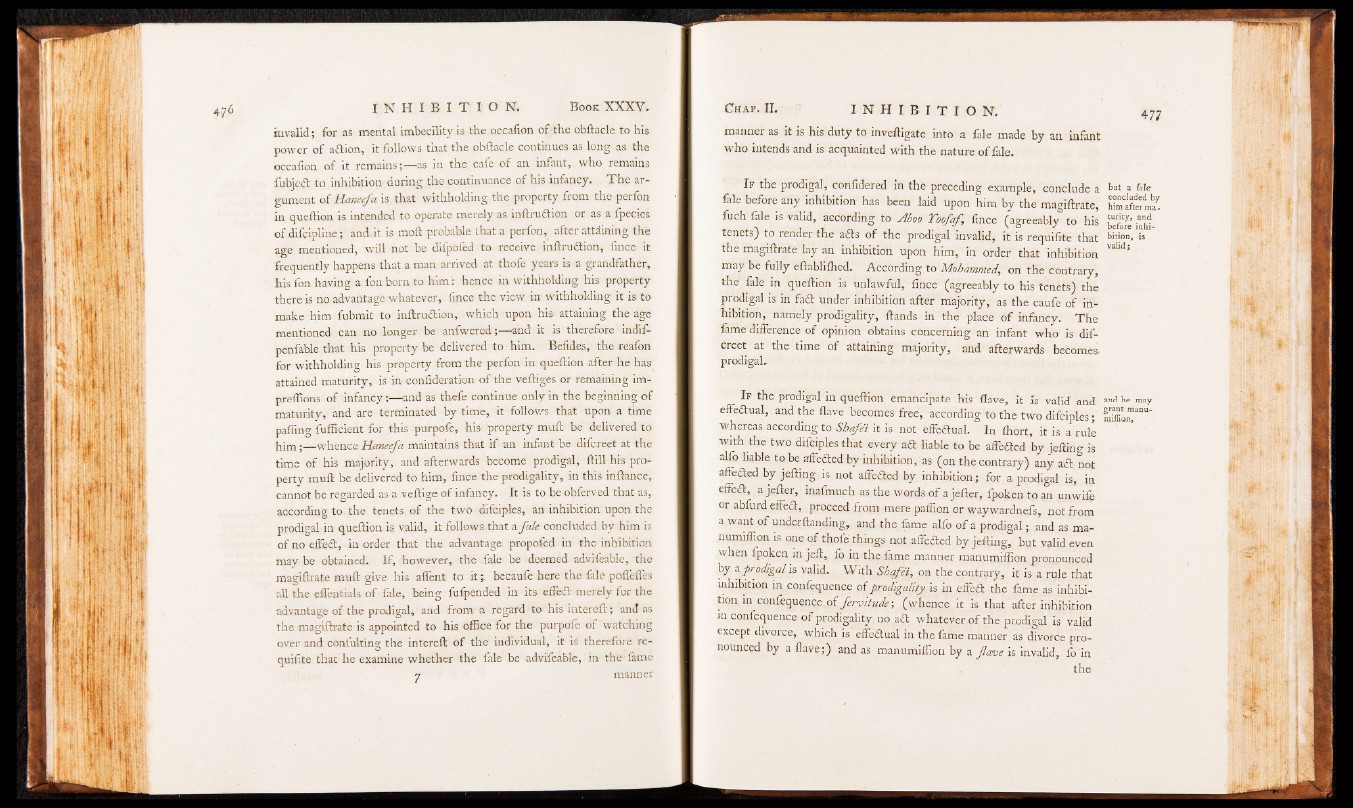
invalid; for as mental imbecility is the occafion of'the obftacle to his
power of adtion, it follows that the obftacle continues as long as the
occafion of it remains;— as in the cafe of an infant, who remains
fubjed to .inhibition during the continuance of his infancy. T h e argument
of Haneefa is that withholding the property from the perfon
in queftion is intended, to operate merely as inftrudion or as a Ipecies
of difpipline;' and.it is moft probable that a perfon, after attaining the
age mentioned, will not be dilpoled to receive inftrudion, fince it
frequently happens that.a man ai'rived at thofe years is a. grandfather,,
his fon having a Ion born to him': hence in withholding, his property
there is no advantage whatever,, fince the view in; withholding it is to
make him fubmit to inftrudion, which upon his attaining the age
mentioned can no longer be anfwered;— and it is therefore indif-
penfable that his property be delivered to him. Befides, the reafon
for withholding his property from the perfon in queftion after he has-
attained maturity,, is in confideration of the veftiges or remaining im-
preffions of infancy;— and as thefe continue only in the beginning of
maturity, and are terminated by time, it follow's that upon a time
paffing fufficient for this purpofe, his property muft be delivered to
him;— whence Haneefa maintains that if an infant be difcreet at the
time of his majority,, and afterwards become prodigal, ftill his property
muft be delivered to him, fince the prodigality, in this inftance,
cannot be regarded as a veftige of infancy. It is to be oblerved that as,
according to the tenets of the two difciples, an inhibition upon the
prodigal in queftion is valid, it follows that a c o n c l u d e d by him is
of no effed, in order that the advantage propofed in the inhibition
may be obtained. If, however, the dale be deemed advifea'ble, the
magiftrate muft give his- affent to i t ; becaufe here the fale pofleffes
all the effentials of fale,. being fufpended in its effed merely for the
advantage of the prodigal, and from a regard to his intereft; and as
the magiftrate is appointed to his office for the purpofe of watching
over and confulting the intereft of the individual, it is therefore, re-
quifite that he examine whether the fale be advifeable, in the fame
7 manner
manner as it is his duty to inveftigate into a fale made by an infant
who intends and is acquainted with the nature of fale.
I f the prodigal, confidered in the preceding example, conclude a
fale before any inhibition has been laid upon him by the magiftrate,
fuch fale is valid, according to Aboo Toofaf, fince (agreeably to his
tenets) to render the ads o f the prodigal invalid, it is requifite that
the magiftrate lay an inhibition upon him, in order that inhibition
may be fully eftabhffied. According to Mohammed, on the contrary,
th e, fale in queftion is unlawful, fince (agreeably to his tenets) the
prodigal is in fad under inhibition after majority, as the caufe of inhibition,
namely prodigality, ftands in the place o f infancy. The
lame difference of opinion obtains concerning an infant who is difcreet
at the time of attaining majority, and afterwards becomes*
prodigal.
I f the prodigal in queftion emancipate his Have, it is valid and
effectual, and the Have becomes free, according to the two difciples;
whereas according to Shafei it is not effedual. In ffiort, it is a rule:
with the two difciples that every aft liable to be affeded by jeftino- is
alfo liable to be affected by inhibition, a-s (on the contrary) any aft not
affeded by jelling is not affeded by inhibition; for a prodigal is, in
effedt, a jefter, inafmuch as the words of a jefter, fpoken to an unwiffi
or abfurd effedt, proceed from mere paffion or waywardness, not from
a want of underllanding, and the fame alfo o f a prodigal; and as ma-
numiffion is one of thofe things not affeded by je lling ,' but valid even
when fpoken in }e,ft, fo 7m the fame manner manumiffion pronounced
by a prodigal \& yalid. With Skqfej, on the contrary, it is a rule that
inhibition in confequenc.e of prodigality x% in effedt the fame as inhibition
in confequence.of fervitude-, (whence it is that after inhibition
in confequence of prodigality, no ad whatever of the prodigal is valid
except divorce, which is' effedtual in the fame manner as divofde pronounced
by a Have;) and as manumiffion by a Jlave is invalid, fo in
the
but a faler
concluded by
him after ma.
turity, and
before inhibition,
is
valid;
and he may
grant manumiffion,